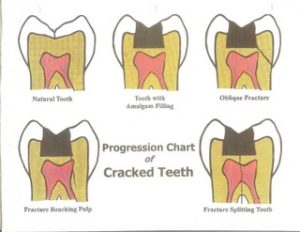Cracked Tooth Syndrome

- Why do teeth get cracked?
Cracked Tooth Syndrome (CTS) is a very common problem, usually affecting teeth with large fillings. The decay and subsequent filling can weaken the remaining tooth structure. After biting on the tooth many times over, a stress fracture can develop.
- Does grinding my teeth make it worse?
Yes, and grinding is a very common habit. Nearly every person will grind their teeth at some point in their life. Grinding causes massive increases (200-300%) in the stress and strain on your teeth. You may benefit from a night guard. Even unfilled teeth can develop cracks.
- Why does it hurt to bite on?
As the tooth flexes microscopically, the nerve is stimulated. Tiny fluid filled tubes (tubules) are located in the dentin, and run down the nerve of the tooth. As the tooth crack opens and closes sucking and pumping takes place on the tubules causing fluid to push and pull on the nerve.
- Why is it sensitive sometimes to hot and cold?
The nerve is aggravated by the crack and bacteria being pumped into it via the tubules. It becomes inflamed due to the toxins in the bacteria.
- If I do nothing, what will eventually happen?
The crack will continue to spread like a crack in glass. It is possible for the crack to go off to the side and a piece of the tooth to break off. The crack can also go as deep as the nerve and into the nerve. It is not a good idea to leave it: a small crack can be treated effectively, but a large crack can lead to root canal treatment or extraction. Pain can become severe and may not be controlled with pain killers.
- What is the best way to treat CTS?
The only real solution is to bind the tooth together with a crown, so that any chewing force moves the tooth as a whole rather that splitting it apart.
- What color will this tooth be?
Most people prefer a natural appearance: therefore an all porcelain crown is made in most cases. Gold crowns are also an option if you prefer.
- Can you guarantee that the nerve will recover?
No! Despite the best treatment, about 10% of cracked teeth have nerves that go on to die. The tooth can still move slightly within the bone and can flex the crack from beneath. Sometimes the existing bacterial damage is so substantial that the nerve goes on to die regardless of what we do.
- What will happen if the tooth does not recover?
The nerve will die and an abscess will probably develop. We would then need to perform root canal treatment. If a crown has already been placed, we can still perform this procedure through the crown. The hole in the crown, created when performing the root canal, will then be restored with a filling that matches the color of the crown.
- Could the nerve in my tooth already be dead?
Yes. Cracks in teeth can develop slowly and this can allow bacteria to enter the nerve. As a result, the nerve can die in a manner that is less noticeable than usual. Many people have teeth which unknown to them have dead nerves.
- Is it safe to leave a tooth with a dead nerve?
Sometimes you can get away with it for a while, but unfortunately these teeth are like ticking time bombs. The low grade infection in them can suddenly flare up causing pain and swelling.
- You said before that a crown was needed in order to avoid the nerve dying. If my nerve is already dead do I still need a crown?
Yes, and even more so. You need a crown now to stop the existing crack (which was severe enough to kill the nerve), from spreading down the brittle root. This is called a ‘vertical root fracture’. This will result in an extraction of the tooth. Crowns are needed on dead teeth more than teeth with living nerves, due to them becoming brittle and more prone to fractures.
If you feel like you have a tooth with Cracked Tooth Syndrome, contact us at 801-255-7600!
Hours Of Operation
Phone: 801-255-7600
Email: [email protected]








